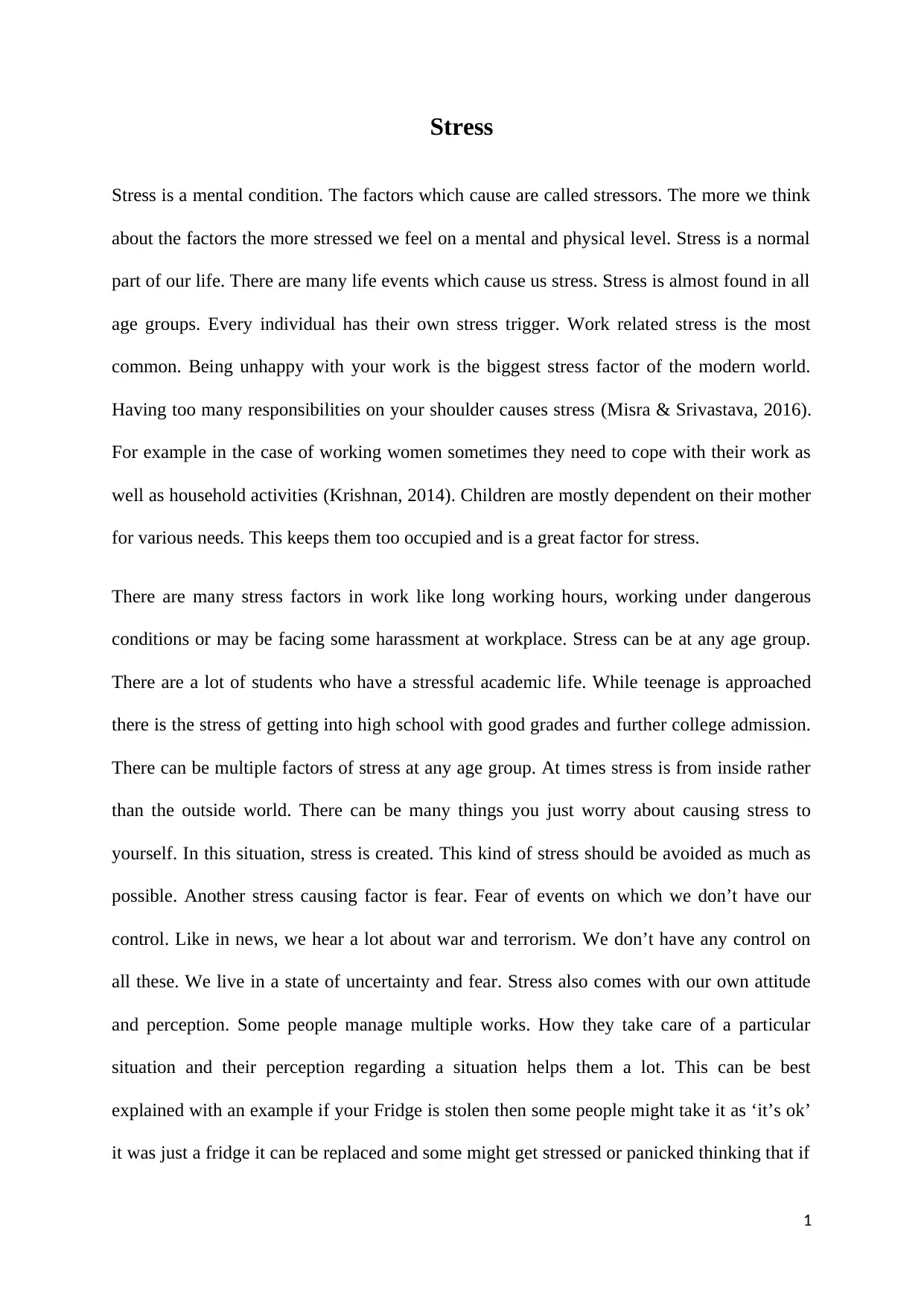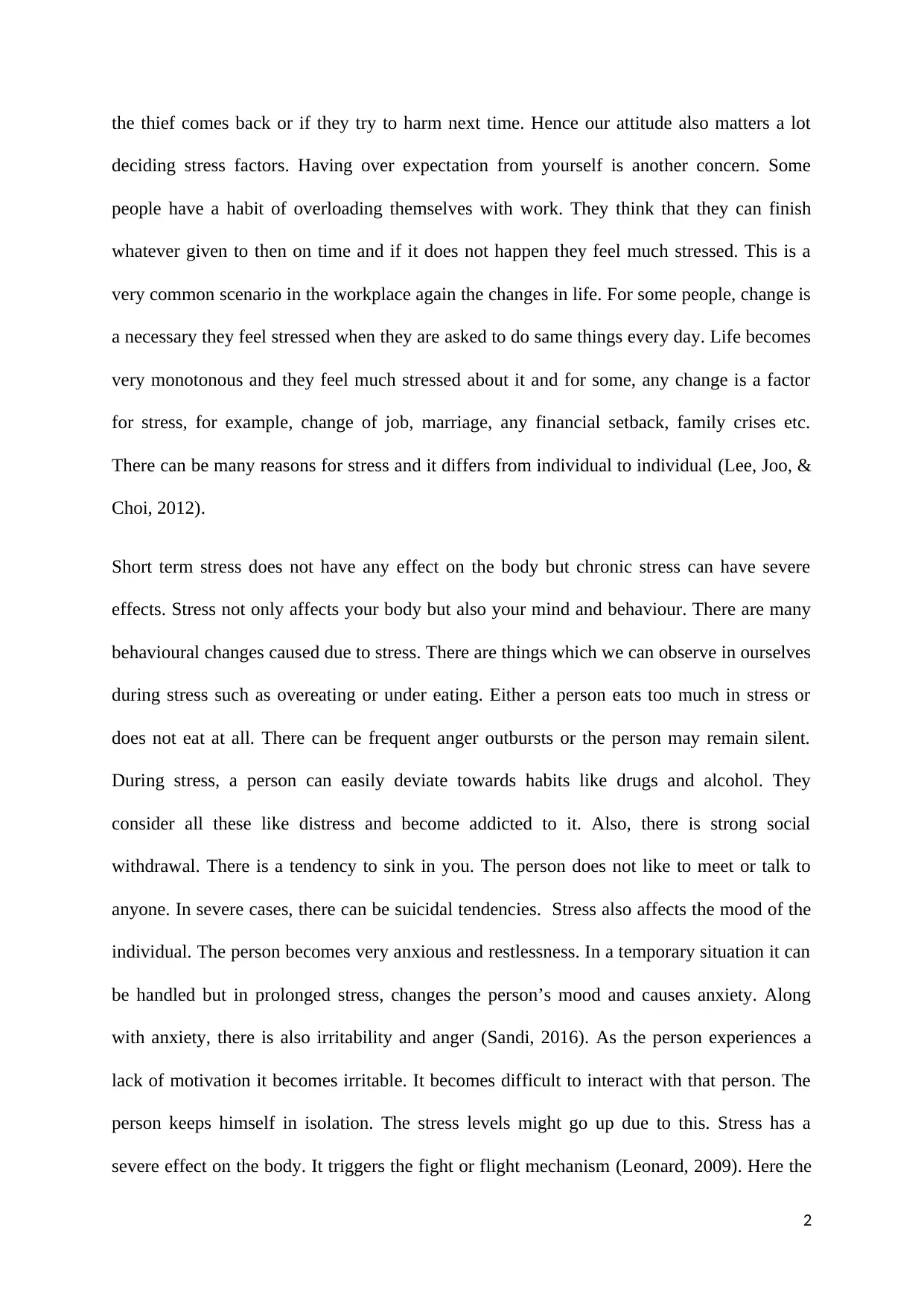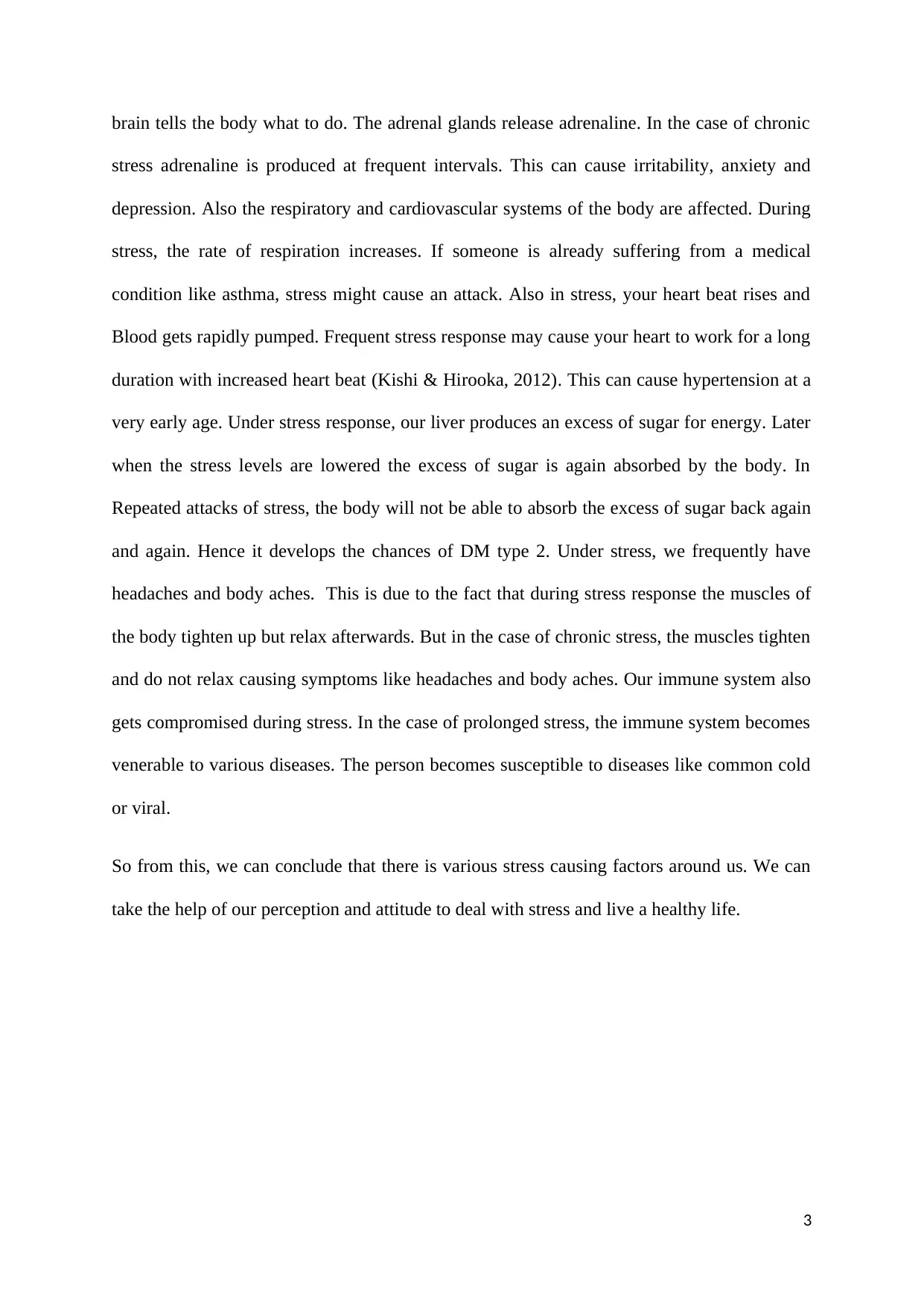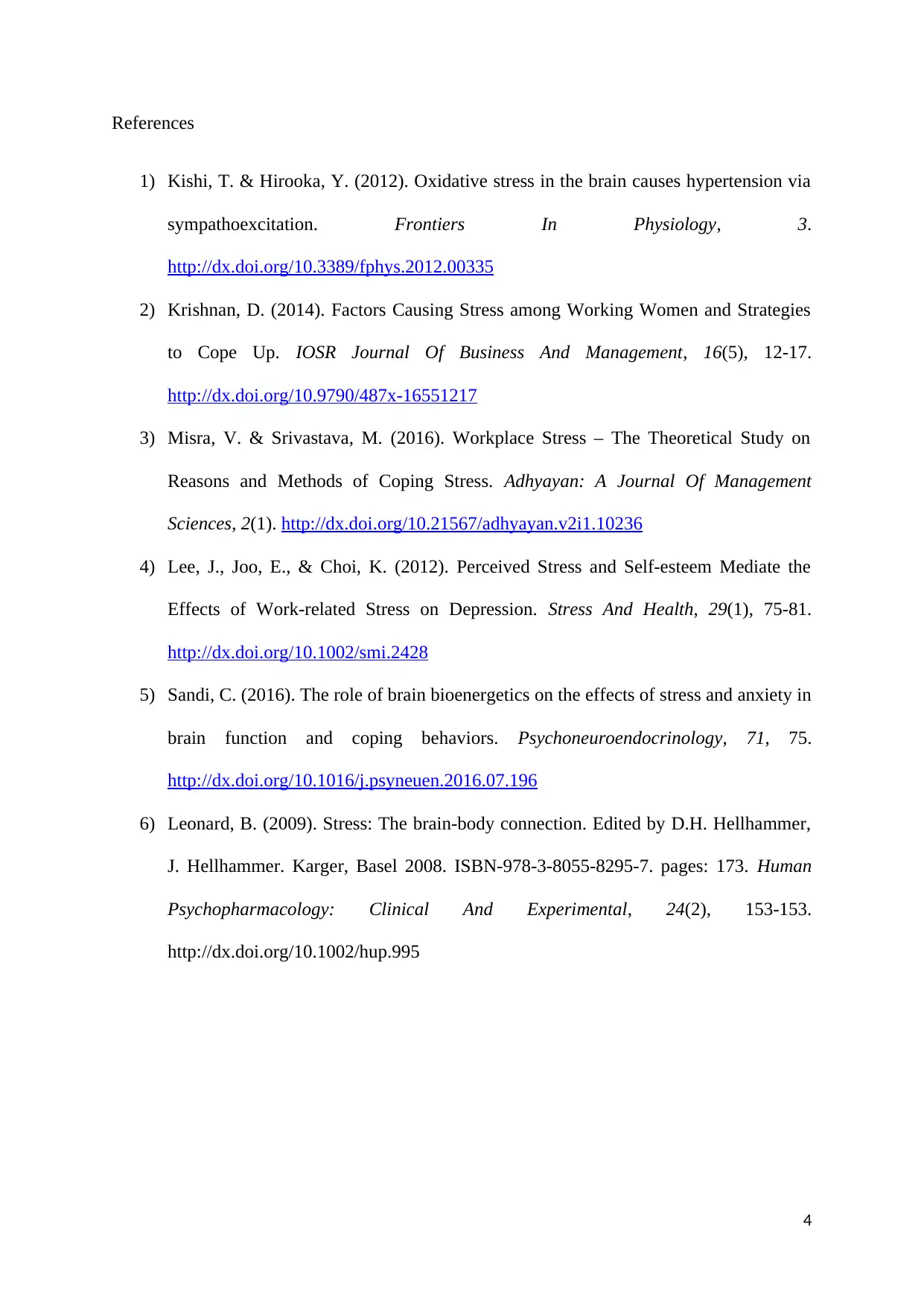Understanding Stress: Causes, Effects, and Coping Strategies
VerifiedAdded on 2019/10/18
|4
|1412
|380
Report
AI Summary
This report provides a comprehensive overview of stress, beginning with an exploration of its various causes, including work-related pressures, academic demands, and personal anxieties. It delves into the physiological effects of stress, such as the activation of the fight-or-flight response, the impact on the cardiovascular and respiratory systems, and the effects on the immune system, potentially leading to conditions like hypertension, type 2 diabetes, and compromised immunity. The report also examines the behavioral changes associated with stress, including alterations in eating habits, mood swings, and social withdrawal. Furthermore, it underscores the importance of individual perceptions and attitudes in managing stress, highlighting the role of coping strategies and the need for proactive approaches to maintain mental and physical well-being. The report concludes by emphasizing that while short-term stress may be manageable, chronic stress can have severe implications, necessitating the adoption of effective management techniques.

Stress
Stress is a mental condition. The factors which cause are called stressors. The more we think
about the factors the more stressed we feel on a mental and physical level. Stress is a normal
part of our life. There are many life events which cause us stress. Stress is almost found in all
age groups. Every individual has their own stress trigger. Work related stress is the most
common. Being unhappy with your work is the biggest stress factor of the modern world.
Having too many responsibilities on your shoulder causes stress (Misra & Srivastava, 2016).
For example in the case of working women sometimes they need to cope with their work as
well as household activities (Krishnan, 2014). Children are mostly dependent on their mother
for various needs. This keeps them too occupied and is a great factor for stress.
There are many stress factors in work like long working hours, working under dangerous
conditions or may be facing some harassment at workplace. Stress can be at any age group.
There are a lot of students who have a stressful academic life. While teenage is approached
there is the stress of getting into high school with good grades and further college admission.
There can be multiple factors of stress at any age group. At times stress is from inside rather
than the outside world. There can be many things you just worry about causing stress to
yourself. In this situation, stress is created. This kind of stress should be avoided as much as
possible. Another stress causing factor is fear. Fear of events on which we don’t have our
control. Like in news, we hear a lot about war and terrorism. We don’t have any control on
all these. We live in a state of uncertainty and fear. Stress also comes with our own attitude
and perception. Some people manage multiple works. How they take care of a particular
situation and their perception regarding a situation helps them a lot. This can be best
explained with an example if your Fridge is stolen then some people might take it as ‘it’s ok’
it was just a fridge it can be replaced and some might get stressed or panicked thinking that if
1
Stress is a mental condition. The factors which cause are called stressors. The more we think
about the factors the more stressed we feel on a mental and physical level. Stress is a normal
part of our life. There are many life events which cause us stress. Stress is almost found in all
age groups. Every individual has their own stress trigger. Work related stress is the most
common. Being unhappy with your work is the biggest stress factor of the modern world.
Having too many responsibilities on your shoulder causes stress (Misra & Srivastava, 2016).
For example in the case of working women sometimes they need to cope with their work as
well as household activities (Krishnan, 2014). Children are mostly dependent on their mother
for various needs. This keeps them too occupied and is a great factor for stress.
There are many stress factors in work like long working hours, working under dangerous
conditions or may be facing some harassment at workplace. Stress can be at any age group.
There are a lot of students who have a stressful academic life. While teenage is approached
there is the stress of getting into high school with good grades and further college admission.
There can be multiple factors of stress at any age group. At times stress is from inside rather
than the outside world. There can be many things you just worry about causing stress to
yourself. In this situation, stress is created. This kind of stress should be avoided as much as
possible. Another stress causing factor is fear. Fear of events on which we don’t have our
control. Like in news, we hear a lot about war and terrorism. We don’t have any control on
all these. We live in a state of uncertainty and fear. Stress also comes with our own attitude
and perception. Some people manage multiple works. How they take care of a particular
situation and their perception regarding a situation helps them a lot. This can be best
explained with an example if your Fridge is stolen then some people might take it as ‘it’s ok’
it was just a fridge it can be replaced and some might get stressed or panicked thinking that if
1
Paraphrase This Document
Need a fresh take? Get an instant paraphrase of this document with our AI Paraphraser

the thief comes back or if they try to harm next time. Hence our attitude also matters a lot
deciding stress factors. Having over expectation from yourself is another concern. Some
people have a habit of overloading themselves with work. They think that they can finish
whatever given to then on time and if it does not happen they feel much stressed. This is a
very common scenario in the workplace again the changes in life. For some people, change is
a necessary they feel stressed when they are asked to do same things every day. Life becomes
very monotonous and they feel much stressed about it and for some, any change is a factor
for stress, for example, change of job, marriage, any financial setback, family crises etc.
There can be many reasons for stress and it differs from individual to individual (Lee, Joo, &
Choi, 2012).
Short term stress does not have any effect on the body but chronic stress can have severe
effects. Stress not only affects your body but also your mind and behaviour. There are many
behavioural changes caused due to stress. There are things which we can observe in ourselves
during stress such as overeating or under eating. Either a person eats too much in stress or
does not eat at all. There can be frequent anger outbursts or the person may remain silent.
During stress, a person can easily deviate towards habits like drugs and alcohol. They
consider all these like distress and become addicted to it. Also, there is strong social
withdrawal. There is a tendency to sink in you. The person does not like to meet or talk to
anyone. In severe cases, there can be suicidal tendencies. Stress also affects the mood of the
individual. The person becomes very anxious and restlessness. In a temporary situation it can
be handled but in prolonged stress, changes the person’s mood and causes anxiety. Along
with anxiety, there is also irritability and anger (Sandi, 2016). As the person experiences a
lack of motivation it becomes irritable. It becomes difficult to interact with that person. The
person keeps himself in isolation. The stress levels might go up due to this. Stress has a
severe effect on the body. It triggers the fight or flight mechanism (Leonard, 2009). Here the
2
deciding stress factors. Having over expectation from yourself is another concern. Some
people have a habit of overloading themselves with work. They think that they can finish
whatever given to then on time and if it does not happen they feel much stressed. This is a
very common scenario in the workplace again the changes in life. For some people, change is
a necessary they feel stressed when they are asked to do same things every day. Life becomes
very monotonous and they feel much stressed about it and for some, any change is a factor
for stress, for example, change of job, marriage, any financial setback, family crises etc.
There can be many reasons for stress and it differs from individual to individual (Lee, Joo, &
Choi, 2012).
Short term stress does not have any effect on the body but chronic stress can have severe
effects. Stress not only affects your body but also your mind and behaviour. There are many
behavioural changes caused due to stress. There are things which we can observe in ourselves
during stress such as overeating or under eating. Either a person eats too much in stress or
does not eat at all. There can be frequent anger outbursts or the person may remain silent.
During stress, a person can easily deviate towards habits like drugs and alcohol. They
consider all these like distress and become addicted to it. Also, there is strong social
withdrawal. There is a tendency to sink in you. The person does not like to meet or talk to
anyone. In severe cases, there can be suicidal tendencies. Stress also affects the mood of the
individual. The person becomes very anxious and restlessness. In a temporary situation it can
be handled but in prolonged stress, changes the person’s mood and causes anxiety. Along
with anxiety, there is also irritability and anger (Sandi, 2016). As the person experiences a
lack of motivation it becomes irritable. It becomes difficult to interact with that person. The
person keeps himself in isolation. The stress levels might go up due to this. Stress has a
severe effect on the body. It triggers the fight or flight mechanism (Leonard, 2009). Here the
2

brain tells the body what to do. The adrenal glands release adrenaline. In the case of chronic
stress adrenaline is produced at frequent intervals. This can cause irritability, anxiety and
depression. Also the respiratory and cardiovascular systems of the body are affected. During
stress, the rate of respiration increases. If someone is already suffering from a medical
condition like asthma, stress might cause an attack. Also in stress, your heart beat rises and
Blood gets rapidly pumped. Frequent stress response may cause your heart to work for a long
duration with increased heart beat (Kishi & Hirooka, 2012). This can cause hypertension at a
very early age. Under stress response, our liver produces an excess of sugar for energy. Later
when the stress levels are lowered the excess of sugar is again absorbed by the body. In
Repeated attacks of stress, the body will not be able to absorb the excess of sugar back again
and again. Hence it develops the chances of DM type 2. Under stress, we frequently have
headaches and body aches. This is due to the fact that during stress response the muscles of
the body tighten up but relax afterwards. But in the case of chronic stress, the muscles tighten
and do not relax causing symptoms like headaches and body aches. Our immune system also
gets compromised during stress. In the case of prolonged stress, the immune system becomes
venerable to various diseases. The person becomes susceptible to diseases like common cold
or viral.
So from this, we can conclude that there is various stress causing factors around us. We can
take the help of our perception and attitude to deal with stress and live a healthy life.
3
stress adrenaline is produced at frequent intervals. This can cause irritability, anxiety and
depression. Also the respiratory and cardiovascular systems of the body are affected. During
stress, the rate of respiration increases. If someone is already suffering from a medical
condition like asthma, stress might cause an attack. Also in stress, your heart beat rises and
Blood gets rapidly pumped. Frequent stress response may cause your heart to work for a long
duration with increased heart beat (Kishi & Hirooka, 2012). This can cause hypertension at a
very early age. Under stress response, our liver produces an excess of sugar for energy. Later
when the stress levels are lowered the excess of sugar is again absorbed by the body. In
Repeated attacks of stress, the body will not be able to absorb the excess of sugar back again
and again. Hence it develops the chances of DM type 2. Under stress, we frequently have
headaches and body aches. This is due to the fact that during stress response the muscles of
the body tighten up but relax afterwards. But in the case of chronic stress, the muscles tighten
and do not relax causing symptoms like headaches and body aches. Our immune system also
gets compromised during stress. In the case of prolonged stress, the immune system becomes
venerable to various diseases. The person becomes susceptible to diseases like common cold
or viral.
So from this, we can conclude that there is various stress causing factors around us. We can
take the help of our perception and attitude to deal with stress and live a healthy life.
3
⊘ This is a preview!⊘
Do you want full access?
Subscribe today to unlock all pages.

Trusted by 1+ million students worldwide

References
1) Kishi, T. & Hirooka, Y. (2012). Oxidative stress in the brain causes hypertension via
sympathoexcitation. Frontiers In Physiology, 3.
http://dx.doi.org/10.3389/fphys.2012.00335
2) Krishnan, D. (2014). Factors Causing Stress among Working Women and Strategies
to Cope Up. IOSR Journal Of Business And Management, 16(5), 12-17.
http://dx.doi.org/10.9790/487x-16551217
3) Misra, V. & Srivastava, M. (2016). Workplace Stress ‒ The Theoretical Study on
Reasons and Methods of Coping Stress. Adhyayan: A Journal Of Management
Sciences, 2(1). http://dx.doi.org/10.21567/adhyayan.v2i1.10236
4) Lee, J., Joo, E., & Choi, K. (2012). Perceived Stress and Self-esteem Mediate the
Effects of Work-related Stress on Depression. Stress And Health, 29(1), 75-81.
http://dx.doi.org/10.1002/smi.2428
5) Sandi, C. (2016). The role of brain bioenergetics on the effects of stress and anxiety in
brain function and coping behaviors. Psychoneuroendocrinology, 71, 75.
http://dx.doi.org/10.1016/j.psyneuen.2016.07.196
6) Leonard, B. (2009). Stress: The brain-body connection. Edited by D.H. Hellhammer,
J. Hellhammer. Karger, Basel 2008. ISBN-978-3-8055-8295-7. pages: 173. Human
Psychopharmacology: Clinical And Experimental, 24(2), 153-153.
http://dx.doi.org/10.1002/hup.995
4
1) Kishi, T. & Hirooka, Y. (2012). Oxidative stress in the brain causes hypertension via
sympathoexcitation. Frontiers In Physiology, 3.
http://dx.doi.org/10.3389/fphys.2012.00335
2) Krishnan, D. (2014). Factors Causing Stress among Working Women and Strategies
to Cope Up. IOSR Journal Of Business And Management, 16(5), 12-17.
http://dx.doi.org/10.9790/487x-16551217
3) Misra, V. & Srivastava, M. (2016). Workplace Stress ‒ The Theoretical Study on
Reasons and Methods of Coping Stress. Adhyayan: A Journal Of Management
Sciences, 2(1). http://dx.doi.org/10.21567/adhyayan.v2i1.10236
4) Lee, J., Joo, E., & Choi, K. (2012). Perceived Stress and Self-esteem Mediate the
Effects of Work-related Stress on Depression. Stress And Health, 29(1), 75-81.
http://dx.doi.org/10.1002/smi.2428
5) Sandi, C. (2016). The role of brain bioenergetics on the effects of stress and anxiety in
brain function and coping behaviors. Psychoneuroendocrinology, 71, 75.
http://dx.doi.org/10.1016/j.psyneuen.2016.07.196
6) Leonard, B. (2009). Stress: The brain-body connection. Edited by D.H. Hellhammer,
J. Hellhammer. Karger, Basel 2008. ISBN-978-3-8055-8295-7. pages: 173. Human
Psychopharmacology: Clinical And Experimental, 24(2), 153-153.
http://dx.doi.org/10.1002/hup.995
4
1 out of 4
Related Documents
Your All-in-One AI-Powered Toolkit for Academic Success.
+13062052269
info@desklib.com
Available 24*7 on WhatsApp / Email
![[object Object]](/_next/static/media/star-bottom.7253800d.svg)
Unlock your academic potential
Copyright © 2020–2026 A2Z Services. All Rights Reserved. Developed and managed by ZUCOL.





